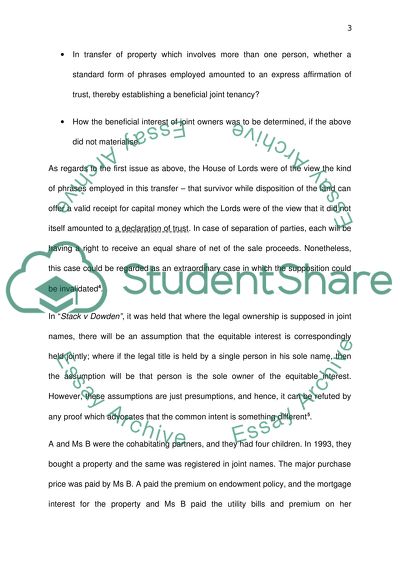Cite this document
(“At its simplest the principle in Stack v Dowden is that a common Essay - 1”, n.d.)
Retrieved from https://studentshare.org/law/1589338-at-its-simplest-the-principle-in-stack-v-dowden-is-that-a-common-intention-trust-for-the-cohabitants-home-to-belong-to-them-jointly-in-equity-as-well-as-on-the-proprietorship-register-is-the-default-option-in-joint-names-cases-the-trust
Retrieved from https://studentshare.org/law/1589338-at-its-simplest-the-principle-in-stack-v-dowden-is-that-a-common-intention-trust-for-the-cohabitants-home-to-belong-to-them-jointly-in-equity-as-well-as-on-the-proprietorship-register-is-the-default-option-in-joint-names-cases-the-trust
(At Its Simplest the Principle in Stack V Dowden Is That a Common Essay - 1)
https://studentshare.org/law/1589338-at-its-simplest-the-principle-in-stack-v-dowden-is-that-a-common-intention-trust-for-the-cohabitants-home-to-belong-to-them-jointly-in-equity-as-well-as-on-the-proprietorship-register-is-the-default-option-in-joint-names-cases-the-trust.
https://studentshare.org/law/1589338-at-its-simplest-the-principle-in-stack-v-dowden-is-that-a-common-intention-trust-for-the-cohabitants-home-to-belong-to-them-jointly-in-equity-as-well-as-on-the-proprietorship-register-is-the-default-option-in-joint-names-cases-the-trust.
“At Its Simplest the Principle in Stack V Dowden Is That a Common Essay - 1”, n.d. https://studentshare.org/law/1589338-at-its-simplest-the-principle-in-stack-v-dowden-is-that-a-common-intention-trust-for-the-cohabitants-home-to-belong-to-them-jointly-in-equity-as-well-as-on-the-proprietorship-register-is-the-default-option-in-joint-names-cases-the-trust.


